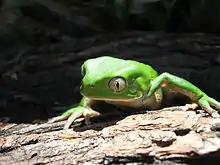Phyllomedusa iheringii
Phyllomedusa iheringii is a species of frog in the subfamily Phyllomedusinae. It is found in southernmost Brazil (Rio Grande do Sul) and Uruguay.[1][2] The specific name iheringii honors Hermann von Ihering, a German-Brazilian zoologist.[3] However, common name southern walking leaf frog has been proposed for it.[1][2]
| Phyllomedusa iheringii | |
|---|---|
 | |
| Scientific classification | |
| Domain: | Eukaryota |
| Kingdom: | Animalia |
| Phylum: | Chordata |
| Class: | Amphibia |
| Order: | Anura |
| Family: | Hylidae |
| Genus: | Phyllomedusa |
| Species: | P. iheringii |
| Binomial name | |
| Phyllomedusa iheringii Boulenger, 1885 | |
| Synonyms[2] | |
| |
Phyllomedusa iheringii occurs in shrubland at elevations less than 500 m (1,600 ft). It is arboreal. The eggs are laid on vegetation above standing water where the tadpoles develop. Phyllomedusa iheringii is common in parts of its range. It might be threatened by pet trade and habitat loss through conversion of native habitat to pastures. It might be present in the Lagoa do Peixe National Park (Brazil).[1]
References
- Axel Kwet; Paulo Garcia; Débora Silvano; Jose Langone. (2004). "Phyllomedusa iheringii". IUCN Red List of Threatened Species. 2004: e.T55854A11381292. doi:10.2305/IUCN.UK.2004.RLTS.T55854A11381292.en. Retrieved 19 August 2021.
{{cite journal}}: CS1 maint: multiple names: authors list (link) - Frost, Darrel R. (2022). "Phyllomedusa iheringii Boulenger, 1885". Amphibian Species of the World: An Online Reference. Version 6.1. American Museum of Natural History. doi:10.5531/db.vz.0001. Retrieved 30 November 2022.
- Beolens, Bo; Watkins, Michael & Grayson, Michael (2013). The Eponym Dictionary of Amphibians. Pelagic Publishing. p. 109. ISBN 978-1-907807-42-8.
Wikimedia Commons has media related to Phyllomedusa iheringii.
This article is issued from Wikipedia. The text is licensed under Creative Commons - Attribution - Sharealike. Additional terms may apply for the media files.
